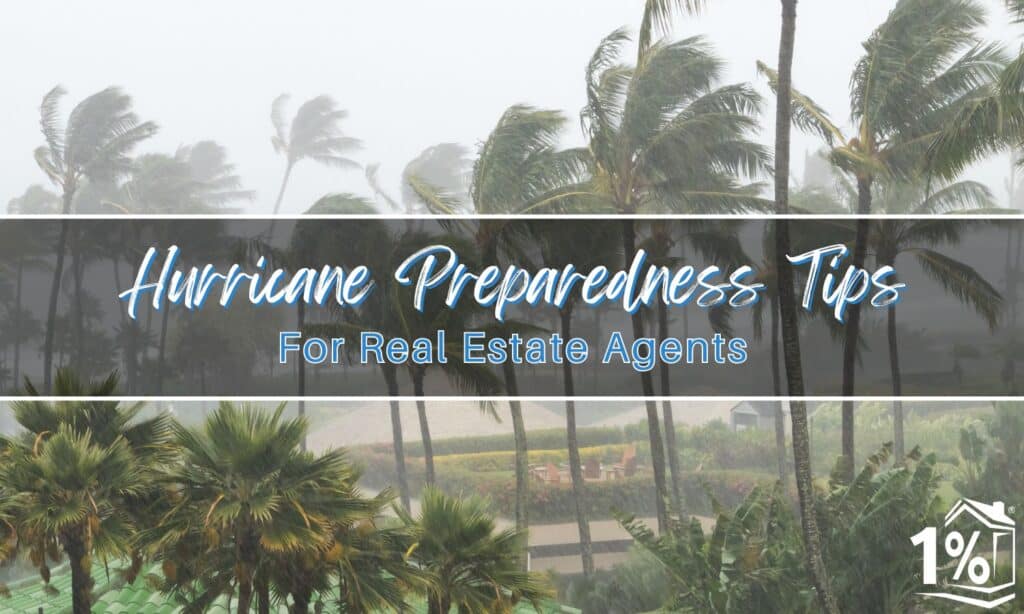Hurricanes, as well as other natural disasters, can massively affect business owners, and real estate agents are no different. As a hurricane approaches, it’s crucial for real estate agents to take thorough steps to safeguard their clients, properties, and business operations.
Securing properties, staying connected, and protecting your own safety is essential to reducing disruptions and ensuring a smooth recovery process. Here are some essential strategies to prepare effectively.
1. Reach Out to Clients Well in Advance
When a storm is on the horizon, inform all clients – buyers, sellers, and any third parties in ongoing transactions – about the hurricane. Set realistic expectations regarding potential delays, rescheduling of appointments, and possible changes to events like showings and closings.
Use a mass email or text update to keep everyone informed and prioritize their safety. Encourage clients to contact you if they have any questions or concerns regarding their property.
2. Secure Properties and Remove Outdoor Items
Take proactive steps to secure each property listing. Move outdoor furniture, double-check that all windows and doors are locked, and take down any real estate signs that could become hazards in strong winds.
In addition to the “For Sale” signs, suggest that sellers bring any decorative items, potted plants, or unsecured outdoor objects indoors to prevent potential damage.

3. Back Up Essential Files
To avoid the stress of losing critical paperwork, make sure all important documents, client data, and listing details are saved either on the cloud or an external hard drive. This precaution allows you access to crucial information even if power outages disrupt local servers.
Consider using services like Google Drive or Dropbox to store updated copies of all documents before the storm. This setup ensures easy access to vital files from any device with internet connectivity, even if local access is compromised.
4. Prepare for Power and Internet Outages
Power and internet services are often interrupted during hurricanes, so ensure that all necessary devices are fully charged in advance, with additional portable chargers ready as backups. It’s also wise to download any critical documents directly to your phone or laptop, enabling offline access if needed.
Keep a car charger on hand. It can be an invaluable backup source if outages last longer than expected, allowing you to stay connected during prolonged power loss.
5. Use Social Media for Client Updates
Social media can be a powerful tool to communicate updates on your availability, rescheduled appointments, and general hurricane preparedness information. This keeps clients informed and demonstrates your commitment to their safety and well-being during challenging times.
Share useful information such as emergency contact numbers, evacuation routes, and hurricane preparedness resources on your social media channels. This can help clients feel supported and keep them informed on essential safety measures.
6. Reschedule Showings and Open Houses
In anticipation of the hurricane, it’s best to cancel or reschedule any upcoming open houses, showings, or in-person meetings. Inform your clients and other agents of these changes in advance, so everyone has time to adjust their plans.
As an alternative, consider offering virtual tours or video walkthroughs of listings until it’s safe to conduct in-person viewings. This allows clients to stay engaged while prioritizing safety.

7. Secure Your Office Space
If you work from an office or home office, take steps to secure your workspace. Back up your computers, unplug electronics, and safeguard any important business documents or real estate materials that could be damaged by water.
If you have a real estate office that you work out of, make sure to protect the office windows with storm shutters or plywood if needed. Valuable items can be stored in waterproof containers to prevent damage from leaks or flooding.
8. Prioritize Personal Safety
And don’t just worry about your daily real estate schedule. While it’s essential to protect your business, the safety of yourself and your family comes first. Follow local emergency guidelines, and if evacuation is advised, don’t delay. Prepare a hurricane kit with necessities like water, food, medications, and crucial documents to have on hand.
Plan for your pets as well, ensuring they have food, water, and necessary supplies. Include them in your evacuation and safety plans.
9. Plan for Post-Storm Recovery
After the hurricane, you may find that some clients need support with property damage or face delays in their transactions. Be prepared to handle these needs with flexibility and empathy, which can strengthen client trust and demonstrate your commitment.
Offer guidance to clients who may need help filing insurance claims or assessing any property damage. Provide referrals to local contractors or disaster recovery services if needed, helping clients navigate the post-storm recovery process.
Final Thoughts
Preparing for a hurricane goes beyond property protection; it’s about staying proactive, safeguarding vital information, and prioritizing everyone’s well-being. With careful preparation and communication, real estate agents can help minimize the impact of a hurricane on their business and clients. Taking these steps will not only protect physical assets but also foster trust with clients, assuring them that you’re well-prepared to handle whatever challenges the storm may bring.
Remember, safety and readiness are the foundation of resilience. Stay prepared and stay safe.

